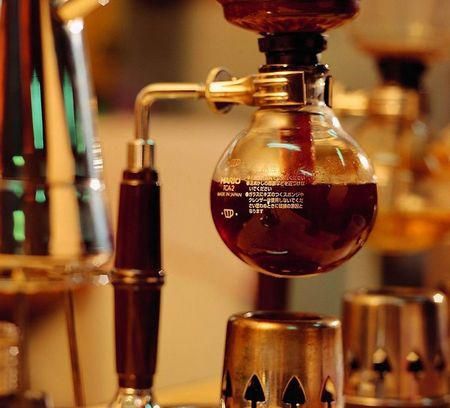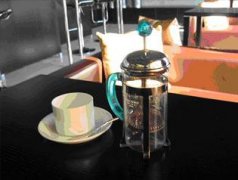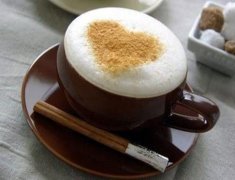How to make coffee? why do you "brew" coffee?
Many young friends, including some old people. They were unfamiliar with coffee, and when they talked about brewing coffee, they were confused, thinking it was a highly skilled and complex activity. Chinese people often use the word "boil" to summarize the production of freshly ground coffee. So to these friends, I do my best to introduce this problem to you.
Why coffee should be "cooked"?
If you have a little understanding of coffee, you must know that coffee is roasted from raw beans to coffee beans that we are all familiar with. So why can't coffee be like tea, pour these beans directly into the pot and boil them, or soak them for a while to make a cup of strong coffee?
We know that coffee is different from tea, it is a seed. Its density is much higher than tea, so it cannot be eaten directly, it needs to be baked at high temperature, this process is not actually puffed. Because only after puffing coffee beans wood fiber structure can be opened. Aromatic substances remain in the crispy roasted (puffed) coffee beans. Coffee beans increase in volume and decrease in density, this process is necessary, otherwise we will not be able to obtain the delicious coffee (about how coffee flavor is formed in the roasting process, because it is too complicated to talk about here).

After the coffee is roasted, it needs to be ground. The purpose of grinding is to increase the contact area between hot water and coffee powder. This allows more aromatic substances to be extracted. We call this phenomenon, called enhanced extraction. Therefore, the whole coffee bean cannot be completely extracted from the coffee flavor, so it cannot be directly boiled with coffee beans.
The next step is to extract the taste of coffee with water in the coffee powder, and the color of coffee is also available. So we want to drink a cup of coffee, coffee beans need to go through: puffing-crushing-extraction, in order to get. Coffee needs to be "cooked."
Can coffee be "cooked"?
If we define "brew" as heating water to 100 degrees and keeping it at that temperature for a long time, coffee cannot be brewed. Because the source of flavor in coffee (aromatic oils) will be destroyed during the long period of high temperature "cooking" process. Therefore, 92 degrees Celsius is the ideal coffee extraction temperature. So whether you are brewing (French press pot), or using coffee machine, or siphon pot and other appliances, the extraction of coffee water temperature is not higher than 96 degrees Celsius. Coffee cannot be brewed in this sense.
In this way, we can clearly see in the production of filter coffee that coffee should be brewed rather than boiled like porridge. We use a variety of heat sources to heat only the water used to extract the coffee, rather than boiling the mixture of water and coffee powder (Turkish coffee is not in the scope of this discussion).
Why instant coffee doesn't need to be cooked.
From the production process of instant coffee, it can be clearly seen that coffee beans are extracted in a specific container after expansion and crushing (but instant coffee refers to this process as extraction) into concentrated solution, filtered, and then dried in two forms, which is why instant coffee is divided into hot dry powder and freeze-dried instant powder. At present, most of the instant coffee in domestic market is hot dry instant powder. However, the solid powder we obtained is precisely the solid soluble substance of coffee. The wood fibers (coffee grounds) of the ground coffee beans have been filtered out after the preparation of the extract. Instant coffee does not need to be brewed. Because of the solid soluble substances of coffee, they are easily dissolved in water.
But for freshly ground coffee, we need to filter out the coffee grounds after coffee extraction.
4. How many times can freshly ground coffee be "boiled"
Many friends often complain that coffee is more expensive than tea, because tea can be brewed repeatedly, while coffee can only be brewed once. Also some friends do not give up, repeatedly coffee extraction. We say that coffee can only be extracted once, and coffee brewed after the first time can no longer be called coffee. Because those brown water is a lot of caffeine, or some burnt substances. We call this brown water Dirty Water. In fact, the standard Western drinking method of black tea is only soaked once.
Important Notice :
前街咖啡 FrontStreet Coffee has moved to new addredd:
FrontStreet Coffee Address: 315,Donghua East Road,GuangZhou
Tel:020 38364473
- Prev

How to use the pressure pot to make coffee the perfect coffee solution
The solution to the perfect coffee is only one step more than instant coffee the French pressure pot seems simple, and it can also make a perfect cup of coffee. Step 1: take clean French presses and coffee cups, and warm the cups if possible. Step 2: put two flat tablespoons of coffee powder in a pressure pot (suppose two cups) and inject boiling water into the desired cup. If possible, after the water injection is finished.
- Next

How to correctly use the structure and characteristics of manual milking machine
Many coffee lovers like to add milk from manual milking machine to pure Italian ESPRESSO coffee to pull flowers and make delicious and beautiful fancy coffee. If the home is equipped with a manual milking machine, first heat the milk and then use the manual milking machine to foam to make cappuccino, saving money, worry and effort. Some friends bought a home semi-automatic coffee machine and wanted to do it.
Related
- Beginners will see the "Coffee pull flower" guide!
- What is the difference between ice blog purified milk and ordinary milk coffee?
- Why is the Philippines the largest producer of crops in Liberia?
- For coffee extraction, should the fine powder be retained?
- How does extracted espresso fill pressed powder? How much strength does it take to press the powder?
- How to make jasmine cold extract coffee? Is the jasmine + latte good?
- Will this little toy really make the coffee taste better? How does Lily Drip affect coffee extraction?
- Will the action of slapping the filter cup also affect coffee extraction?
- What's the difference between powder-to-water ratio and powder-to-liquid ratio?
- What is the Ethiopian local species? What does it have to do with Heirloom native species?

